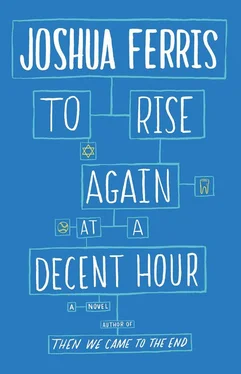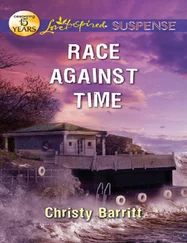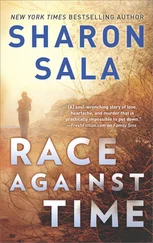The Red Sox scored in the third. I let out a shout, and Eddie awoke with a start. He looked at me with a blank expression. I think he was wondering who I was and why I was in his apartment. Minutes later the Orioles went up 2–1. I sat there rocking a little. Then it was Boston’s turn. Scutaro scored in the fourth, and then Pedroia hit a homer into deep left to put us up 3–2. Meanwhile, the Rays were getting creamed by the Yankees. Everything was sort of okay for the moment.
If my father were alive, he would have been tracking the game on a scorecard. He started the practice as a boy, listening to Jim Britt on a Zenith Consoltone. I brought his old scorecards out during games sometimes, ran my fingers over the nicks and numbers made with a pencil in his little hand, long before his troubles began: a partial history of baseball told in the hieroglyphics of a dead man.
Bottom of the fifth, I walked over to Eddie. He was talking in his sleep. I put my ear close to his mouth. “Sonya…” he was saying. “Sonya…”
“Eddie,” I said. “Hey, Eddie.”
Eddie opened his eyes and searched my face again.
“It’s almost the sixth inning,” I said. “I have to go into the other room soon, because I never watch the sixth inning. So I need you to watch the game for me and tell me what happens. Can you do that for me?”
“Who’s that?” he said.
“It’s Dr. O’Rourke,” I said. “Your new dentist. Can you watch the sixth inning for me, Eddie, and tell me what happens?”
A few minutes later, I was standing in his bedroom, near the door.
“Still awake, Eddie?”
“Huh?”
“You have to keep your eyes open,” I said. “I need you to watch the inning for me, top and bottom.”
There was a rain delay in the seventh. I was back in front of the TV, listening to Eddie whisper in his sleep for his Sonya. When I toggled over to the Yankees game, I was shocked. Ayala had replaced Logan on the mound, and the Rays had gone on a tear. Soon they had tied the Yankees. A home run by the Rays’ Evan Longoria secured the win. We had to win now just to stay alive.
I switched back to the Red Sox game. Papelbon struck out Jones. He struck out Reynolds. Davis came to the plate. Poised on the mound, fierce eyes shaded under the brim of his cap, Papelbon received pitch signals from his battery mate. It was the bottom of the ninth. We were only one out shy of victory. Davis’s bat inscribed nervous little arcs in the air as he waited for the pitch. The entire stadium held its breath.
If Papelbon failed to put Davis away, I realized, we would complete the worst September collapse in the history of baseball. That would restore a necessary order, repairing some of the damage of the previous decade’s extraordinary victories. But a loss was still a loss. I’d still feel miserable. But if we won, I’d feel even worse. I would be shut out of victory by the moral collapse that would follow, and it would fail once again to bring him back. So if we lost, I lost, and if we won, I lost. I had abided by strict superstitions all my life — for what? I wore the hat, ate the chicken, skipped the sixth, taped every game… for what? For the right to suffer one way or the other. That was no way to live. There had to be hope, no matter how hopeless. There had to be effort that might not be doomed. I had nothing left: no Santacroce dream, no Plotz homecoming. My parents were gone. Connie had left. My patients refused to floss, some even to fill their cavities. I had… my will, that was all. My will not to follow Mercer and my father down the hole. My will to be something more than a fox.
It was a full count. Papelbon eased into his windup. I turned off the TV and walked out of Eddie’s apartment.
I LIVED AT SEIR, in the compound located in the far south of Israel, for twenty-one days the following year, trying to remain open to everything I had spent my life resisting. I read the Cantaveticles front to back, heard the rest of the story of my family’s flight from Poland, and took my turn in the kitchen preparing dinner for the other reclaimants. I slept on a cot. I visited the Dead Sea. I had the inside of my cheek swabbed to determine the likelihood of my Ulmish descent.
At dusk and at dawn, I watched the Bedouin on their strutting camels glide by in the distance, on their way out to the desert. Hidden away inside layers of dark clothes, moving inexorably and with pathological silence, they struck me as the loneliest people on earth.
I was never lonely, and never had to be lonely again. There were formal classes in the whitewashed buildings and nightly debates around the dinner table. The others with me weren’t lunatics or zealots, or even culty and weird, but reasonably groomed, politically progressive, on average younger than I had expected. They were really into it: the reclaimed history, the theological complexities of doubt, the continual threat of mass extinction. More than a few could talk about such things all night long. By the end of week 3, it had all become exhausting and a little tedious to me, like touring the churches of Europe with Connie. I missed espresso and central air. I wanted to go home.
That doesn’t explain why I returned a year later, or the year after that.
I guess I needed to make myself vulnerable. I was sick of the facts, the bare facts, the hard, scientific facts. I was saying: Look at me, seeking among the dubious. Doing something stupid, something stark raving mad. Look at me, risking being wrong.
Tourism is a big deal in Israel. You can hire a guide to take you to the famous desert of Ein Gedi, to Qumran where the Dead Sea Scrolls were found, and to Masada, where Jewish rebels held off Roman centurions until they could hold them off no longer. Or you can take a tour with Grant Arthur in his Mazda CX-7 and travel to places no one’s heard of and listen, with as much skepticism as you please, as he conjures a history at highway junctions and distant points in the desert. Battles took place just on the other side of that security fence, he’ll tell you. Miracles happened right here at this electrical substation. There are some who express no skepticism at all on such a tour. They believe every word and don’t give a damn about your hard facts. Deal with it.
I never received an apology from Grant Arthur for turning my life upside down. “You wouldn’t be here if you needed an apology,” he said to me. “You’re here. You’re happy. What’s to apologize for?” I wasn’t sure I should just forgive and forget, but he did his best to convince me that there was no reason to hold a grudge, or even to ask him, “Why me?” “Remember, I didn’t reach out to you,” he would say. “You emailed me.” He was suggesting that he might have done nothing more than make a website for a dental practice on which to publish parts of the Cantaveticles if I hadn’t emailed Seir Design and demanded the site be taken down. “The message comes when the message is needed,” he would say. “I didn’t steal your identity, Paul. I returned it.” And: “If you doubt any of this, you are already on the right path.” He always wore a beige vest with mesh pockets and a pair of cargo pants, had a neat little beard and perfect WASP teeth. “Most men live their lives vacillating between hope and fear,” he’d say. “Hope for heaven, on the one hand, fear of nothingness on the other. But now consider doubt. Do you see all the problems it solves, for man and for God?”
The life of the Ulms continued to grow online. I was so wrapped up at the time in the appropriation of my identity that I wasn’t aware until later just how much more was going on. A book was published called A Partial History of the Dispossessed, by Tomas Stover, a professor emeritus at the University of Auckland, with chapters on the Jews, the Maori, the Native Americans, as well as less publicized dispossessions — the Akunsi, the Chaggossians of Diego Garcia, and of course the Ulms. Other historians countered with articles and denunciations, which changed the focus of the group’s Wikipedia page. There was an inexorable logic to it all when the main focus became not Amalekite slaughters and the debate over Israeli aggression but the right of some people to make loose claims about their historical legitimacy, to publish books about it and stand by it as established fact. It was this controversy that secured the page’s permanence. Now it’s a more or less stable document, its partisans stalemated in a zero-sum game, in the collapse of absolutes brought to you online. But still they tweak, and correct, and caution one another to remain civil, above all to try and remain neutral.
Читать дальше












